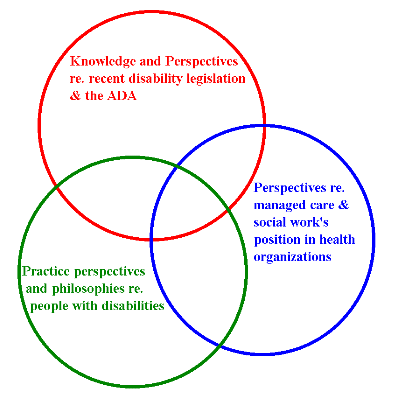

People with disabilities have begun to call attention to their need for increased inclusion and self-determination regarding decisions affecting the course of their treatment by health and rehabilitation providers. At the same time, administrators have been implementing managed care policies which seek to control costs by limiting the range options available to health care practitioners and their clients. This suggests that some health practitioners may be facing difficult choices about how to adequately respond to the concerns as well as the independent living goals of disabled people.
As indicated by the graphic image above, this study explored the knowledge and practice perspectives of social workers employed in health organizations regarding: (1) their knowledge about major shifts in disability law, policy and the independent living needs and desires articulated by people in the disability rights movement; (2) their perspectives on the receptivity of administration in their organizations to disability issues and to suggestions for changes brought by social workers; and (3) the practice modalities and techniques they use when working with people with disabilities.
During the spring and summer of 1995, a purposive sample of 286
social workers employed in 57 health and rehabilitation organizations
in California and Washington responded to a survey questionnaire
developed for this study. Several major findings were generated:
(1) Most respondents were knowledgeable about recent disability
legislation such as the Americans with Disabilities Act,
and were familiar with a limited number of the major issues advocated
by disability rights authors and leaders. (2) Respondents tended
to feel that their organizations were flexible and responsive
to the requests and needs of disabled people. Moreover, they generally
felt that social workers and their departments were influential
in their organizations. (3) Virtually all respondents believed
that direct services, community practice and advocacy practice
were important parts of their roles in helping disabled people.
However, while most respondents indicated that they generally
were quite engaged in clinical activities with disabled people
and their families, they reported relatively little actual community
and advocacy practice activity.